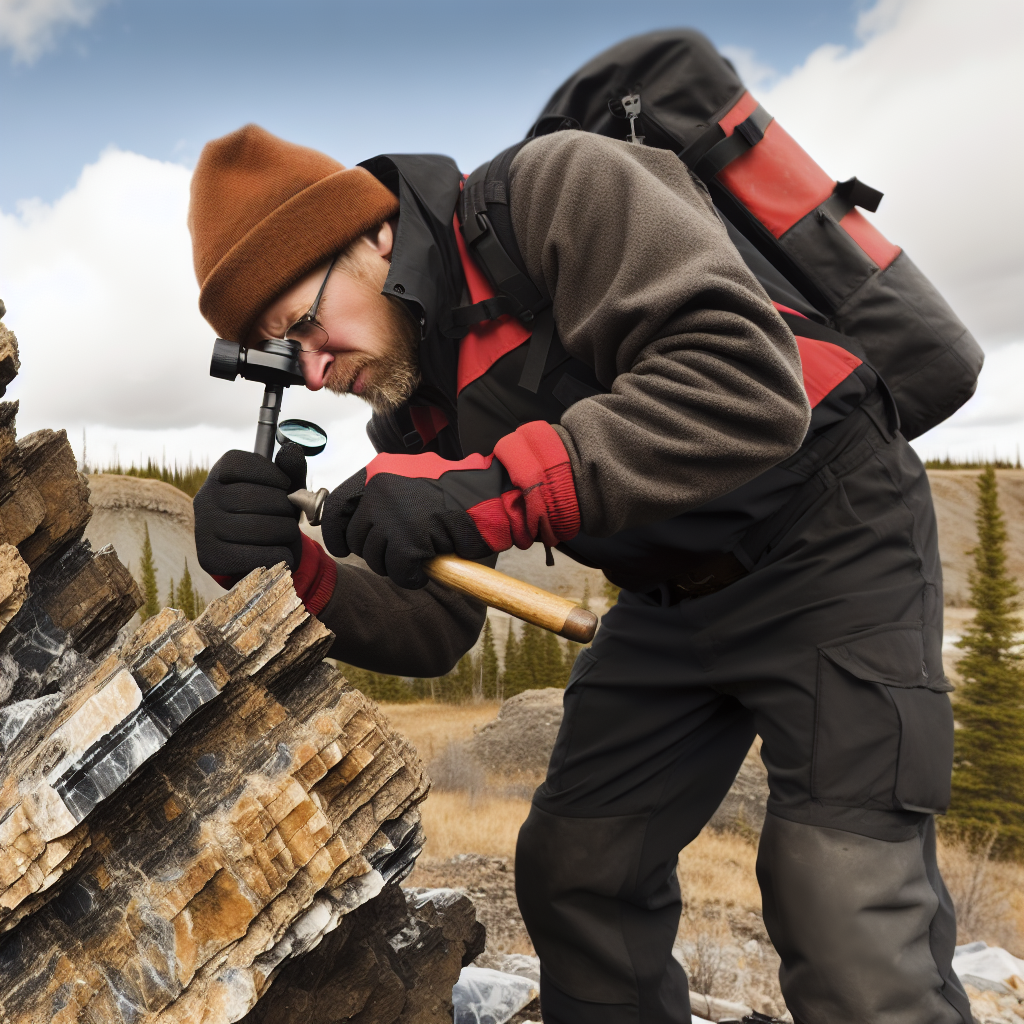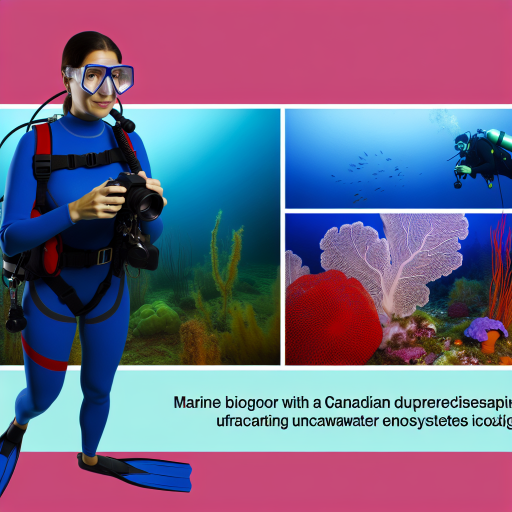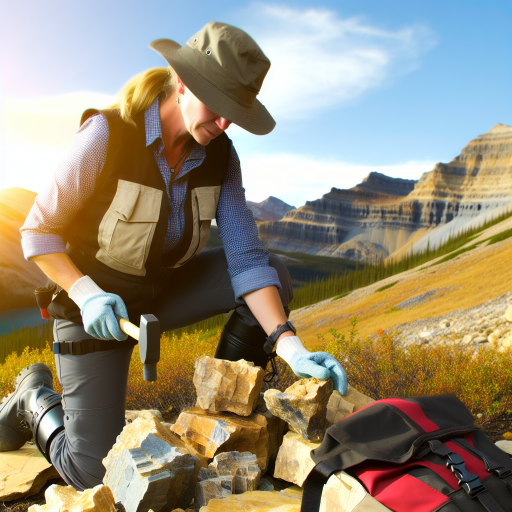Overview of a Geologist’s Role in Canadian Industry and Research
Geologists play a vital role in Canada’s natural resource sectors.
They focus on understanding the Earth’s processes and materials.
This understanding aids in resource exploration and extraction.
Furthermore, geologists contribute to environmental protection efforts.
They assess geological hazards to ensure public safety.
Exploration and Resource Management
Geologists conduct field studies to locate mineral deposits.
They use advanced technology, including geophysical surveys.
These studies often involve sampling and testing rock formations.
Data collected guides companies in resource management decisions.
Moreover, their findings support sustainable practices in mining.
Environmental Impact Assessments
Geologists evaluate the potential impacts of resource extraction.
They assess how projects affect local ecosystems and communities.
Geologists also contribute to water resource management.
They study groundwater systems to ensure long-term sustainability.
Collaboration with environmental scientists enhances project outcomes.
Academic and Research Contributions
Many geologists work in academic or governmental institutions.
They engage in research to advance geological science.
Publications in scientific journals promote knowledge sharing.
Moreover, universities often collaborate with industry partners.
This collaboration fosters innovation in geoscience research.
Professional Development and Networking
Geologists in Canada benefit from various professional organizations.
Organizations like the Canadian Institute of Mining and Metallurgy provide resources.
They offer workshops and conferences for continuous learning.
Networking opportunities help geologists connect with peers.
Such connections can lead to career advancements and collaborations.
Unlock Your Career Potential
Visualize a clear path to success with our tailored Career Consulting service. Personalized insights in just 1-3 days.
Get StartedMorning Routine: Preparing for Fieldwork or Office Analysis
Starting the Day
The day begins early for a Canadian geologist.
I usually wake up around 6:00 AM to enjoy some quiet time.
This peaceful moment allows me to mentally prepare for the day ahead.
After waking, I brew a strong cup of coffee.
Caffeine helps boost my energy levels for the tasks that await.
Planning the Day
Once I finish my coffee, I review the day’s objectives.
If I’m heading into the field, I check the weather report.
This ensures I’m prepared for any environmental conditions.
I then consult my research notes for the day’s locations.
Having a solid plan increases productivity and focus.
Preparing Equipment
Next, I gather the necessary equipment for fieldwork.
This includes geological tools, safety gear, and a sturdy backpack.
For office days, I prepare my laptop and relevant samples.
I double-check all instruments to ensure they are functional.
Proper preparation minimizes delays and facilitates data collection.
Healthy Breakfast
Before heading out, I prepare a nutritious breakfast.
Whole grains, fruit, and protein fuel my body for the day’s challenges.
A balanced meal enhances my concentration and stamina.
I often enjoy oatmeal topped with berries and nuts.
This provides the perfect start to an active day.
Final Preparations
Finally, I make sure I have everything packed and ready.
Before leaving, I review my checklist one last time.
This habit helps prevent any forgotten items.
With all set, I step outside feeling motivated and excited.
The journey to discover Canada’s geological wonders begins.
Equipment and Technology Used in Geological Surveys
Essential Tools for Field Work
Geologists rely on various field tools for effective surveying.
GPS devices help researchers pinpoint exact locations.
Handheld rock hammers enable geologists to sample rocks easily.
Field notebooks are crucial for documenting observations.
Binoculars assist in identifying geological features from a distance.
Advanced Surveying Equipment
Modern technology provides advanced tools for geological investigations.
Ground-penetrating radar (GPR) reveals subsurface features non-invasively.
Handheld X-ray fluorescence (XRF) analyzers identify elemental compositions quickly.
Laser scanners gather 3D data for accurate geological mapping.
Drone technology offers aerial perspectives for larger survey areas.
Data Collection and Analysis Software
Data collection and analysis are vital in modern geological surveys.
Geographic Information System (GIS) software organizes spatial data efficiently.
Three-dimensional modeling software visualizes complex geological structures.
Statistical analysis tools help interpret survey results robustly.
Field data can be synchronized with remote servers for real-time analysis.
Safety Gear and Environmental Considerations
Safety gear is essential in the field to prevent injuries.
Geologists wear helmets and sturdy footwear for protection.
Environmental considerations guide equipment use in sensitive areas.
Choosing eco-friendly tools reduces the ecological footprint of surveys.
Regular training ensures adherence to safety protocols while surveying.
Delve into the Subject: Canada’s Role in Space Exploration: New Opportunities in Research and Development
Fieldwork Activities
Preparing for Fieldwork
Fieldwork begins with careful planning and preparation.
Geologists gather necessary equipment for the day.
They ensure they have tools for sampling and data collection.
Proper clothing and safety gear are also essential.
Furthermore, they review maps and previous data.
Collecting Samples
The first task involves collecting rock and soil samples.
Geologists use various tools such as hammers and chisels.
The team works efficiently to gather specimens from different locations.
Each sample is carefully labeled for identification.
Importantly, they maintain a consistent collection methodology.
Documenting Observations
Accurate documentation is crucial during fieldwork.
Geologists take notes about geological formations and structures.
They often use cameras to capture visual references.
This data helps in analysis and reporting later.
Additionally, they may collect GPS coordinates for site locations.
Analyzing Data in the Field
Before leaving, initial data analysis occurs on-site.
Geologists review collected samples and notes together.
This collaboration enhances accuracy and detail in findings.
Field analysis provides immediate insights into geological features.
Moreover, it informs further research directions.
Challenges Faced in Various Terrains
Working in remote areas presents unique challenges.
Geologists must adapt to weather conditions quickly.
They often encounter rugged landscapes and difficult access.
Furthermore, safety hazards can arise unexpectedly.
Effective teamwork and communication mitigate these risks.
Delve into the Subject: Exploring the Impact of AI in Canadian Scientific Research Careers
Data Analysis in the Lab
Processing Collected Samples
Geologists handle various samples collected during fieldwork.
These samples may include rocks, minerals, and soil.
Each sample undergoes careful examination in the laboratory.
First, we categorize the samples based on their physical properties.
This process enables effective analysis and identification.
Next, we prepare the samples for testing.
Preparation may include slicing, grinding, or polishing the samples.
Such methods help reveal essential characteristics of the materials.
After preparation, we perform detailed examinations.
We often utilize microscopy to observe the samples closely.
Utilizing Software for Data Analysis
Modern geologists rely on sophisticated software for analysis.
This software aids in processing and interpreting data efficiently.
Geochemical programs help analyze the composition of samples.
Such tools provide insights into mineral content and structure.
We also use geographic information systems for spatial analysis.
This allows us to visualize data in the context of geographical locations.
Transitioning data into these software programs is crucial.
We meticulously input data to ensure accuracy and reliability.
Furthermore, data visualization enhances our understanding.
Charts and graphs often illustrate significant patterns and trends.
Collaboration and Continuous Learning
Collaboration among team members optimizes the analysis process.
Geologists share insights and findings during group discussions.
Collectively, we refine methodologies and enhance results.
Continuous learning is vital in this evolving field.
We keep abreast of technological advancements and best practices.
Attending conferences and workshops fosters professional development.
This commitment to learning benefits both individual geologists and our teams.
Ultimately, effective data analysis assists in making informed decisions.
Our work contributes to understanding Canada’s geological framework.
Learn More: How to Get Ahead in Canada’s Biomedical Research Sector
Collaboration with Other Scientists and Stakeholders in Projects
The Importance of Teamwork
Collaboration is vital in geology projects.
Geologists often work closely with other scientists.
This teamwork fosters a diverse range of perspectives.
Moreover, it enhances problem-solving capabilities.
Building Relationships with Stakeholders
Engaging with local communities is essential for any geology project.
Geologists must understand the needs of stakeholders.
This understanding shapes project goals and outcomes.
Additionally, collaboration with government agencies is crucial.
Such partnerships can facilitate necessary permits and support.
Interdisciplinary Approaches
Many projects require interdisciplinary collaboration.
For instance, geologists team up with biologists and chemists.
This approach can lead to more comprehensive research results.
It also helps to address environmental concerns effectively.
Technological Cooperation
Collaboration with technology experts adds value to geological projects.
Geologists often utilize advanced mapping and modeling software.
Cooperating with IT professionals can enhance data accuracy.
Furthermore, integrating technology streamlines project workflows.
Case Studies of Successful Collaboration
Previous projects demonstrate successful collaboration outcomes.
The Alberta Energy Regulator exemplifies effective stakeholder engagement.
Collaboration with Indigenous communities in British Columbia brings valuable insights.
These partnerships greatly enhance project relevance and sustainability.
Gain More Insights: The Most Promising Science Careers in Canada Today

Challenges Faced in the Field
Weather Conditions
Weather can significantly impact geological fieldwork.
Geologists often contend with harsh weather phenomena.
Extreme temperatures can hinder both productivity and safety.
Rain and snow can obscure important geological features.
Additionally, strong winds may complicate equipment setup.
Accessibility Issues
Getting to remote locations proves challenging.
Many sites require extensive travel via rugged terrain.
Some areas remain inaccessible during certain seasons.
Geologists often require off-road vehicles for access.
Logistical planning is crucial for successful expeditions.
Safety Concerns
Fieldwork carries inherent safety risks for geologists.
They may encounter unstable rock formations during sampling.
Wild animals pose additional threats in remote regions.
Proper safety gear and training are essential for protection.
Additionally, communication devices help ensure contact with teams.
Career Advancement Opportunities and Continuing Education in Geology
Paths to Career Growth
Geologists have various paths for career advancement.
Many progress into specialized areas such as environmental geology.
Others may choose to focus on mining, oil, or natural resources.
Leadership roles often require significant experience and education.
Networking can open doors to many opportunities in this field.
Professional organizations offer valuable connections and resources.
Mentorship programs can further assist with career development.
Importance of Continuing Education
Continuing education is vital for geologists to stay current.
Technology in the field is continually evolving.
Additionally, regulations and best practices frequently change.
Webinars and workshops can provide essential training.
Many universities offer certification programs tailored for professionals.
Pursuing advanced degrees can lead to better job prospects.
Certification and Professional Development
Certification often enhances a geologist’s credibility and marketability.
Obtaining certifications such as P.Geo. can be beneficial.
Associations like the Canadian Council of Professional Geoscientists offer this certification.
Attending conferences and seminars can also provide learning opportunities.
Continuing education credits are a requirement for maintaining certification.
Online Learning Opportunities
Online courses have become increasingly popular among geologists.
Platforms like Coursera and edX offer specialized geology courses.
These courses allow for flexible learning schedules.
Additionally, they may cover topics like geospatial technologies.
Online learning fosters peer interaction and networking as well.
Future Trends in Geology Education
Geology education will likely evolve significantly in the coming years.
There is a growing emphasis on sustainability and environmental studies.
Curriculums may incorporate more interdisciplinary approaches.
Emerging technologies like AI are here to stay in geology education.
Collaboration with other sciences will enhance geological research.
The Impact of Geological Work on Environmental Conservation and Resource Management
Significance of Geological Studies
Geological studies are crucial for understanding Earth’s processes.
Moreover, they provide insights into resource distribution and sustainability.
Geologists analyze rock formations to assess natural resources.
This analysis aids in planning for sustainable extraction methods.
Impact on Environmental Conservation
Geologists play a vital role in environmental conservation efforts.
They identify areas that require protection from mining and development.
By studying ecosystems, they recommend practices that minimize damage.
Additionally, geologists assess the impacts of climate change on landscapes.
Resource Management Strategies
Effective resource management relies heavily on geological expertise.
Geologists ensure responsible mining and energy extraction practices.
They advocate for the sustainable use of water resources linked to geology.
Furthermore, they help in assessing the feasibility of renewable energy sites.
Collaboration with Environmental Agencies
Geologists often collaborate with environmental agencies and NGOs.
They conduct studies that influence policy and regulatory frameworks.
Through partnerships, they develop strategies for land restoration.
Such collaborations enhance public awareness of geological impacts.
Community Education and Engagement
Educating communities about geology fosters environmental stewardship.
Geologists share knowledge on land-use planning and risk mitigation.
They host workshops that emphasize the importance of geological health.
Thus, they empower communities to engage in conservation activities.
Additional Resources
Earthquake Facts & Earthquake Fantasy | U.S. Geological Survey




